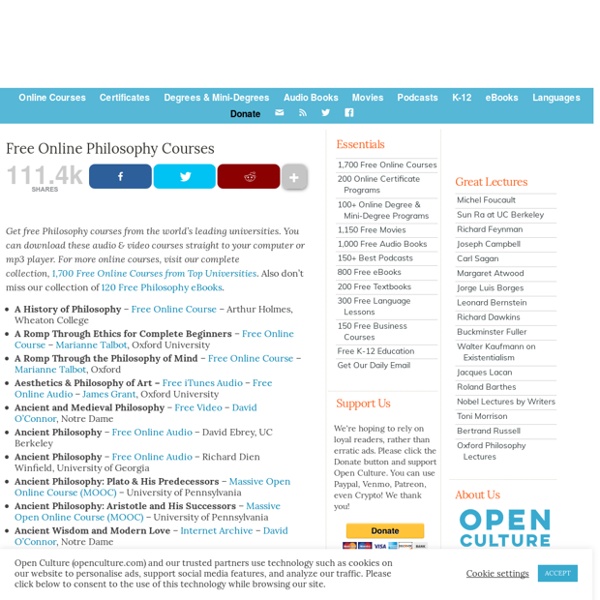More Intelligent Life - StumbleUpon
masterymistery/flickr Why is pleasure so suspicious? None of the greatest western philosophers has produced a proper guide for today's enlightened hedonist, writes Anthony Gottlieb.
25 Great Thinkers Every College Student Should Read
By Donna Scott College is for expanding one’s intellectual horizons. Unfortunately, drinking and having fun, can distract from learning about history’s great thinkers.
Romanticism and Realism, The Enlightenment and Industrial Revolution - Aesthetics - Objectivism Online Forum
Romantic Realism is what she called it. Industrialization had a very revolutionary impact in people's life to the point that it would have been absurd for no observer to point out. But I re-started this thread to go to the sources and share this short work by one of the poets listed above. Quod clarâ et perspicuâ demonstratione careat pro vero habere mens omnino nequit humana.BACON de Augment. Scient.Advertisement.As a love of truth is the only motive which actuates the Author of this little tract, he earnestly entreats that those of his readers who may discover any deficiency in his reasoning, or may be in possession of proofs which his mind could never obtain, would offer them, together with their objections to the Public, as briefly, as methodically, as plainly as he has taken the liberty of doing.
The Oldest Living Things in the World: A Decade-Long Photographic Masterpiece...
by Maria Popova What a 13,000-year-old eucalyptus tree reveals about the meaning of human life. “Our overblown intellectual faculties seem to be telling us both that we are eternal and that we are not,” philosopher Stephen Cave observed in his poignant meditation on our mortality paradox And yet we continue to long for the secrets of that ever-elusive eternity.
The Trolley Problem from Jeremy Stangroom
Jeremy Stangroom posted a link on philosop-l to his site, where he has given 4 problems interactive electronic versions. I’m using a link here to all 4 problems, but I’ve only looked at the trolley problem. It seems to me very well done, but that’s not quite what we’re going on to look at.
A Visual Dictionary of Philosophy: Major Schools of Thought in Minimalist Geo...
by Maria Popova A charming exercise in metaphorical thinking and symbolic representation. Rodin believed that his art was about removing the stone not part of the sculpture to reveal the essence of his artistic vision.
Jeremy Stangroom
God knows why, but I’m still pondering issues of consent (though why what follows is relevant in this respect might not be immediately clear). Here’s another thought experiment. It’s the evening of the Christmas office party.
The Mortality Paradox
by Maria Popova “Our overblown intellectual faculties seem to be telling us both that we are eternal and that we are not.” “It is quite impossible for a thinking being to imagine nonbeing, a cessation of thought and life,” Goethe, who ceased to be 181 years ago this week, proclaimed as he concluded that “in this sense, everyone carries the proof of his own immortality within himself.” Since the dawn of time, it has been the human instinct to resolve the psychological dilemma by constructing various immortality narratives — one of the hallmarks of our species. In Immortality: The Quest to Live Forever and How It Drives Civilization (public library), Cambridge University philosopher Stephen Cave explores the inner workings of that ancient impulse, inviting us on a mind-bending, intense, at times unsettling and at times deeply comforting journey into the most cavernous quarters of the human psyche. The fact is, whenever we try to imagine the reality of our deaths we stumble.
Social Contract Theory
Social contract theory, nearly as old as philosophy itself, is the view that persons’ moral and/or political obligations are dependent upon a contract or agreement among them to form the society in which they live. Socrates uses something quite like a social contract argument to explain to Crito why he must remain in prison and accept the death penalty. However, social contract theory is rightly associated with modern moral and political theory and is given its first full exposition and defense by Thomas Hobbes.



